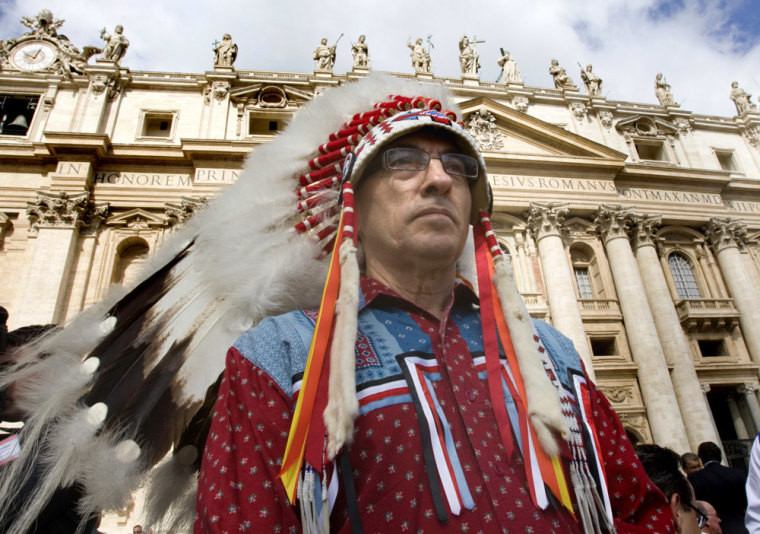Pope Benedict XVI apologized Wednesday to native Canadians who were physically and sexually abused at church-run boarding schools they were forced to attend, saying he was sorry for their anguish and was praying they would heal.
Benedict met with a group of former students and victims and told them of his "personal anguish" over their suffering, they said. They emerged from the meeting happy and comforted, said Phil Fontaine, national chief of the Assembly of First Nations.
From the 19th century until the 1970s, more than 150,000 Indian children in Canada were forced to attend state-funded Christian schools as an effort to assimilate them into Canadian society. The Canadian government has admitted that physical and sexual abuse was rampant in the schools, with students beaten for speaking their native languages.
That legacy of abuse and isolation has been cited by Indian leaders as the root cause of epidemic rates of alcoholism and drug addiction on reservations.
The Canadian government has formally apologized and offered billions of dollars in compensation. The Catholic Church itself has paid some $79 million in compensation — but hadn't issued any type of institutional regret until Wednesday.
"What we wanted the pope to say to us was that he was sorry and ... that he deeply felt for us," said Fontaine, himself a victim of abuse at one of the schools. "We heard that very clearly today."
'With renewed hope'
Out of a delegation of 40, five Indian and five Catholic church representatives met privately with the pope to share their stories. The pope spoke with them, off-the-cuff, in both Italian and English.
"Given the sufferings that some indigenous children experienced in the Canadian residential school system, the Holy Father expressed his sorrow at the anguish caused by the deplorable conduct of some members of the church and he offered his sympathy and prayerful solidarity," a Vatican statement said.
"His Holiness emphasized that acts of abuse cannot be tolerated in society," it said, adding that the pope was praying that the victims would heal and move forward "with renewed hope."
It was the latest apology by Benedict for the abuse committed by church members against the young. During his trip to the United States last year, Benedict said he was "deeply ashamed" of the clergy sex abuse scandal that devastated the American church. And in Australia, he told victims of abuse he was "deeply sorry" for their suffering.
Road to reconciliation
Archbishop James Weisgerber of Winnipeg, the head of the Canadian bishops' conference, said the trip to Rome was the "high point" of efforts to forge reconciliation between the church and the aboriginals.
"It's a long journey and the church is committed to be with the" native Canadians, he said.
Nearly three-quarters of the 130 schools were run by Catholic missionary congregations.
The native Canadians brought the pope blankets, pipes, moccasins and a gift of an eagle feather, one of the highest honors in aboriginal culture. Some of the items were left at the Vatican, while others were returned after being blessed by the pontiff.
"I feel very pleased and encouraged by the spirit of goodwill and the real commitment on the part of the Catholic Church to rebuild the relationship," Fontaine said. "The meeting was all about healing," he said. "We leave very happy."
The aim of the residential school system was to isolate the native Canadians from the influence of their homes and culture, which the government at the time considered inferior to mainstream Canadian society.
Exploitation and cruelty
While many students say they received good education at the schools, they are now a symbol of exploitation and cruel treatment of native Canadians. Children, many of whom did not speak English, were forcibly taken from their homes and often harshly punished. Others were subjected to sexual abuse.
Canadian Prime Minister Stephen Harper issued a formal apology in Parliament last year, calling the treatment of children at the schools a sad chapter in the country's history. He said the policy of forced assimilation was wrong, had caused great harm and had no place in the country.
Canada also has offered compensation, part of a lawsuit settlement between the government, churches and the approximately 90,000 surviving students that amounted to billions of dollars being transferred to aboriginal communities.
The United, Presbyterian and Anglican churches already have apologized for their roles in the abuse.
In addition to the government apology and compensation, a Canadian truth and reconciliation commission will also examine government policy and take testimony from survivors. The goal is to give survivors a forum to tell their stories and educate Canadians about a grim period in the country's history.
More on Pope Benedict XVI | Vatican
